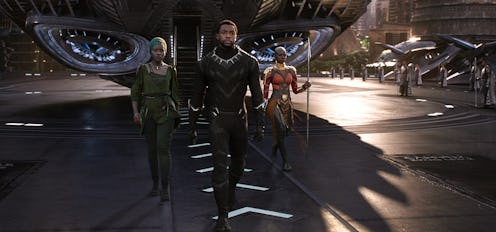Entertainment
'Black Panther' Is The First Superhero Movie Nominated For Best Picture At The Oscars

After almost 12 months of dominating the pop culture conversation, Black Panther has officially made the leap from superhero movie to Oscar-nominated film. Black Panther has been nominated for Best Picture at the 2019 Academy Awards, making history as the first superhero and the first Marvel film to do so. The groundbreaking film was also nominated in six other categories — Best Original Score, Best Original Song, Best Costume Design, Best Production Design, Best Sound Editing, and Best Sound Mixing — making it one of the most successful films of the morning announcements.
Black Panther is the first superhero genre film ever to be nominated for Best Picture, though others have come close. As noted by CNBC, The Dark Knight proved that superhero movies could be worthy of more than just visual effects awards when it won two Oscars in 2009, including one for Best Supporting Actor. And last year, Logan made history as the first superhero movie nominated for Best Adapted Screenplay. Still, none have come close to the coveted Best Picture nomination. That is, until now.
Granted, Oscar nominations are not the be all and end all of the film industry. Marvel and superhero movies were doing quite well without any shiny golden statues from the Academy, thank you very much. Black Panther made over $1.3 billion worldwide, per Box Office Mojo, before it was nominated for any awards. It even out-grossed Avengers: Infinity War domestically. But despite this unprecedented success, it was still just one of the many films that has given Marvel Studios success at the box office. Now, however, Black Panther has given it something else.
Prior to the 2019 Oscar nomination announcement, Marvel Studios had acquired only 10 nominations in it's 10 year history, according to CNBC. Thanks to Black Panther's seven nominations, plus one for Avengers: Infinity War for Best Visual Effects, that number nearly doubled in a matter of minutes. And with this nomination for Best Picture, Black Panther has given Marvel something it never had before: indisputable legitimacy.
Not only is Black Panther the first superhero movie nominated for Best Picture, it's also the first Marvel movie nominated for Best Picture. Now, given the rate at which the MCU releases movies, one could argue that it was only a matter of time. However, the fact that it is Black Panther that is breaking this barrier is significant, not just because it's Marvel or because it's a superhero movie, but because of what the film represents.
Black Panther is Marvel's first film about a black superhero, with an almost entirely black cast and a diverse creative team. Yes, the film's box office success sent a message to Marvel and to other Hollywood studios that audiences are craving more blockbusters about people of color. Now that Oscars are in play, well, it's an entirely new ballgame. Hopefully the box-office success, critical acclaim, and now awards show love that Black Panther has received will make studios more inclined to making diverse films.
Of course, Black Panther didn't earn its Best Picture nomination simply because of its subject matter. It was the filmmaking talent behind it that made the movie what it is. Director Ryan Coogler, who, it should be noted, was snubbed for Best Director, had only made two films before Black Panther — Fruitvale Station and Creed. And while both of those were successful, they were far from multi-million dollar superhero productions. Needless to say, the investment in young, fresh talent paid off. Need more proof? Black Panther was also nominated for Best Production Design, earning Hannah Beachler, Marvel's first female production designer, according to journalist Kyle Buchanan, a nomination. Beachler is now reportedly the first African American ever nominated in that category.
Not only should Black Panther's Oscar success act as motivation for Marvel and other major studios to expand their stories beyond the white male hero, it should also act as evidence that hiring outside of the overwhelmingly white male norm is not a risky move, but a smart one.